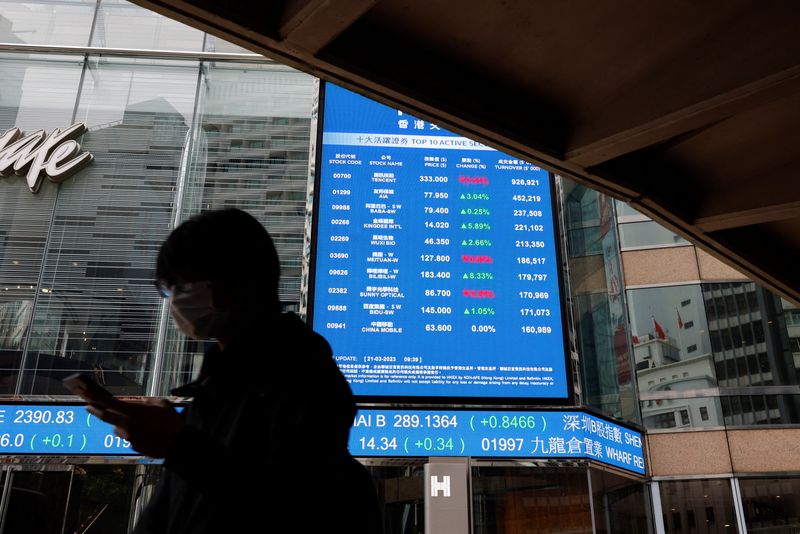By Jamie McGeever
(Reuters) - A look at the day ahead in Asian markets.
As buoyant investors brace for potentially one of the most significant days of the year on Wednesday with U.S. inflation and the Federal Reserve's policy decision, Asian markets have their own obstacles to hurdle beforehand.
Thailand's central bank sets interest rates, against a backdrop of deteriorating investor confidence and stocks sliding to their lowest since late 2020, while China releases its latest producer and consumer price inflation figures.
To be sure, global market sentiment seems to be bullish. At least it is on Wall Street - a 7% surge in Apple shares (NASDAQ:AAPL) to new highs on Tuesday lifted the S&P 500 and Nasdaq to new highs also. Treasury yields fell back ahead of the Fed's decision too.
But risk appetite in Asia is more patchy, and uncertainty around China's outlook is big reason why.
Is Beijing winning the fight against deflation? Domestic asset markets suggest investors are far from convinced - bond yields are languishing at historic lows, stocks on Monday hit a six-week low, and the yuan fell to its weakest level against the dollar since November.
Economists expect annual consumer inflation in May to inch up to 0.4% from 0.3%, but the month-on-month rate to slip to zero from 0.1%. That hardly smacks of a rapidly reflating economy, but it would be the first time in a year with four positive readings in a row.
On the other hand, annual factory gate inflation is expected to remain deeply negative at -1.5%. Year-on-year producer prices have been falling every month since October 2022.
The Bank of Thailand, meanwhile, is expected to leave its key interest rate unchanged at 2.50% for a fourth straight meeting on Wednesday, and not cut it until the final three months of the year.
That's later than previously forecast. Although inflation has remained well below the central bank's upper tolerance limit of 3% for more than a year, the Thai baht has lost around 6% this year.
The BoT delivers its decision a day after the country's benchmark stock index fell as much as 1.5% to its lowest since November 2020. It is down this year, easily underperforming the MSCI Asia ex-Japan index, which is up 5.5%.
Three court cases in Thailand, including one that has ensnared the prime minister, have heightened political uncertainty in Southeast Asia's second largest economy and sent investors fleeing its stock market.
Elsewhere in Asia on Wednesday unemployment numbers from South Korea, industrial production figures from India and Japan's latest wholesale inflation data will keep investors on their toes.
Japan's annual wholesale inflation is expected to more than double in May to 2.0%, which would be the highest since September.
Another currency to watch in Asia is Indonesia's rupiah, which hit a four-year low on Tuesday.
Here are key developments that could provide more direction to markets on Wednesday:
- China producer & consumer inflation (May)

- Thailand interest rate decision
- India industrial production (April)